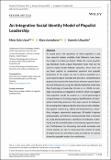Files in this item
An integrative social identity model of populist leadership
Item metadata
| dc.contributor.author | Uysal, Mete Sefa | |
| dc.contributor.author | Jurstakova, Klara | |
| dc.contributor.author | Uluşahin, Yasemin | |
| dc.date.accessioned | 2022-11-14T12:30:27Z | |
| dc.date.available | 2022-11-14T12:30:27Z | |
| dc.date.issued | 2022-12-01 | |
| dc.identifier | 282142836 | |
| dc.identifier | 2f2aeaae-3a10-4cb6-8bfd-1bffe8a5248c | |
| dc.identifier | 85141387216 | |
| dc.identifier | 000877546600001 | |
| dc.identifier.citation | Uysal , M S , Jurstakova , K & Uluşahin , Y 2022 , ' An integrative social identity model of populist leadership ' , Social and Personality Psychology Compass , vol. 16 , no. 12 , e12713 . https://doi.org/10.1111/spc3.12713 | en |
| dc.identifier.issn | 1751-9004 | |
| dc.identifier.other | RIS: urn:89466E9026A41D249C8C7CD36CD46544 | |
| dc.identifier.uri | https://hdl.handle.net/10023/26394 | |
| dc.description | Funding: Open Access funding enabled and organized by Projekt DEAL. | en |
| dc.description.abstract | In recent years, the questions of what populism is and how populist leaders mobilize their followers have been the subject of extensive debate. While the social psychology literature holds unique theoretical tools that can be used to explain leader-follower dynamics, these have not yet been applied to understand populism and populist leadership. In this paper, we aim to discuss populism as a social-psychological concept and provide a comprehensive approach to examine the interactions between populist leaders and followers by using the identity leadership model (see New Psychology of Leadership, Haslam et al., 2020). Accordingly, we propose an integrative model in which we suggest that populism should be treated as a social-psychological concept based on (i) strong ingroup identification; (ii) interactive leadership processes that open spaces to followers for enacting their ingroup identity that end up with mobilization against vertical (e.g., elites) and horizontal (e.g., minorities, refugees, opponents) outgroups; (iii) leader's ingroup prototypicality and identity entrepreneurship that is boosted by using shared grievances, narratives of collective victimhood, and the destabilization of mainstream opponent leaders. Furthermore, by discussing real-world examples and recent studies, we aim to show how the content of what it means to be 'us' and what is seen as moral to 'us' can be shaped by populist leaders for mobilization. | |
| dc.format.extent | 16 | |
| dc.format.extent | 525322 | |
| dc.language.iso | eng | |
| dc.relation.ispartof | Social and Personality Psychology Compass | en |
| dc.subject | Entrepreneurship | en |
| dc.subject | Leadership | en |
| dc.subject | Populism | en |
| dc.subject | Prototypicality | en |
| dc.subject | Social identity | en |
| dc.subject | Victimhood | en |
| dc.subject | BF Psychology | en |
| dc.subject | SDG 16 - Peace, Justice and Strong Institutions | en |
| dc.subject | NIS | en |
| dc.subject | MCC | en |
| dc.subject.lcc | BF | en |
| dc.title | An integrative social identity model of populist leadership | en |
| dc.type | Journal item | en |
| dc.contributor.institution | University of St Andrews. School of Psychology and Neuroscience | en |
| dc.identifier.doi | 10.1111/spc3.12713 | |
| dc.description.status | Peer reviewed | en |
This item appears in the following Collection(s)
Items in the St Andrews Research Repository are protected by copyright, with all rights reserved, unless otherwise indicated.

